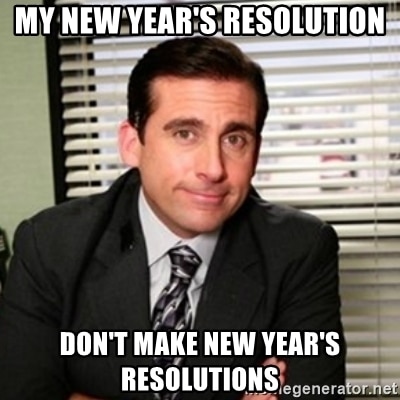For the 50% of your that feel like Michael Scott, this may not be for you.
However, If you’re one of 31% of people planning to make a New Year’s resolution this year, or one of the 19% that are still undecided, now is a great time to reflect on the previous 11 (almost 12) months and begin setting some intentions for the year ahead.
Some New Year’s Resolution stats:
The most popular resolutions for 2021 are exercising more and improving fitness (50% of participants), losing weight (48%), saving money (44%), and improving diet (39%).
- Of those who make a New Year’s resolution, after 1 week 75% are still successful in keeping it.
- After two weeks, the number drops to 71%.
- After 1 month, the number drops again to 64%.
- After 6 months, 46% of people who make a resolution are still successful in keeping it.
- After 1 year, 35% kept all their resolutions, 49% kept some of their resolutions, and only 16% failed at keeping any of their resolutions.
So, looking out to 2022, what are the steps you can take to increase the likelihood of being part of the 35% cohort that keeps all of their resolutions?
How to make (and keep!) your New Year’s Resolution
A recent NYT article by Jen Miller provides some helpful guidance on this topic:
“Your goals should be smart — and SMART. That’s an acronym coined in the journal Management Review in 1981 for specific, measurable, achievable, relevant and time-bound. It may work for management, but it can also work in setting your resolutions, too.”
- Your resolution should be absolutely clear. “Making a concrete goal is really important rather than just vaguely saying ‘I want to lose weight.’ You want to have a goal: How much weight do you want to lose and at what time interval?” said Katherine L. Milkman, an associate professor of operations information and decisions at the Wharton School of the University of Pennsylvania. “Five pounds in the next two months — that’s going to be more effective.”
- This may seem obvious if your goal is a fitness or weight loss related one, but it’s also important if you’re trying to cut back on something, too. If, for example, you want to stop biting your nails, take pictures of your nails over time so you can track your progress in how those nails grow back out, said Jeffrey Gardere, a psychologist and professor at Touro College of Osteopathic Medicine. Logging progress into a journal or making notes on your phone or in an app designed to help you track behaviors can reinforce the progress, no matter what your resolution may be.
- Achievable. This doesn’t mean that you can’t have big stretch goals. But trying to take too big a step too fast can leave you frustrated, or affect other areas of your life to the point that your resolution takes over your life — and both you and your friends and family flail. So, for example, resolving to save enough money to retire in five years when you’re 30 years old is probably not realistic, but saving an extra $100 a month may be. (And if that’s easy, you can slide that number up to an extra $200, $300 or $400 a month).
- Relevant. Is this a goal that really matters to you, and are you making it for the right reasons? “If you do it out of the sense of self-hate or remorse or a strong passion in that moment, it doesn’t usually last long,” said Dr. Michael Bennett, a psychiatrist and co-author of two self-help books. “But if you build up a process where you’re thinking harder about what’s good for you, you’re changing the structure of your life, you’re bringing people into your life who will reinforce that resolution, then I think you have a fighting chance.”
- Time-bound. Like “achievable,” the timeline toward reaching your goal should be realistic, too. That means giving yourself enough time to do it with lots of smaller intermediate goals set up along the way. “Focus on these small wins so you can make gradual progress,” Charles Duhigg, author of “The Power of Habit” and a former New York Times writer, said. “If you’re building a habit, you’re planning for the next decade, not the next couple of months.”
New Year’s resolutions not for you?
Consider setting some basic intentions.
11 ways to make the most of 2022 (written by Diego Perez, @yung_pueblo):
- let yourself change
- make rest a high priority
- say no without feeling bad
- stop jumping to conclusions
- do not rush important things
- build your own idea of success
- make more time for key friends
- appreciate the small steps forward
- stay aligned with your highest goals
- take the risk when your intuition says yes
- build with people who are open to growth
Godspeed and good luck.






